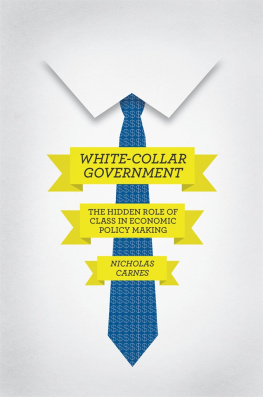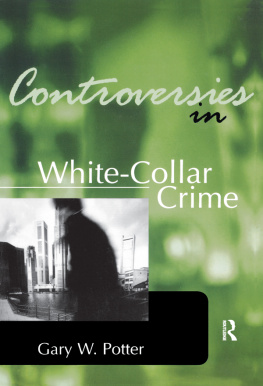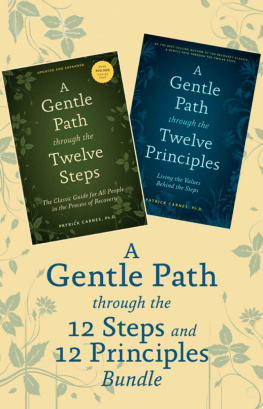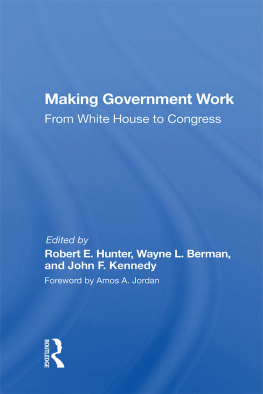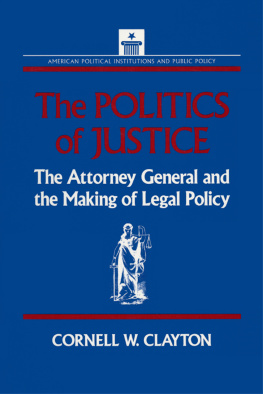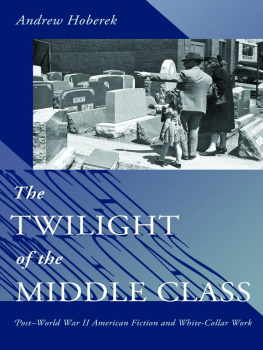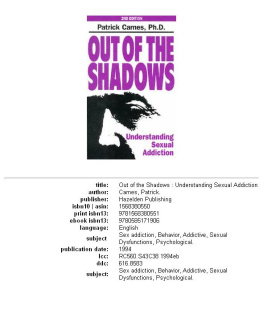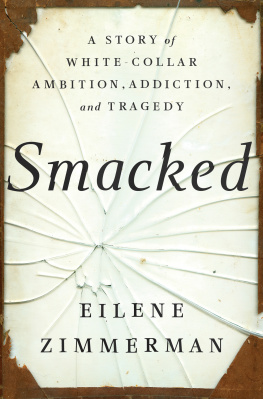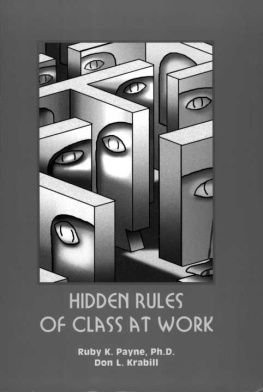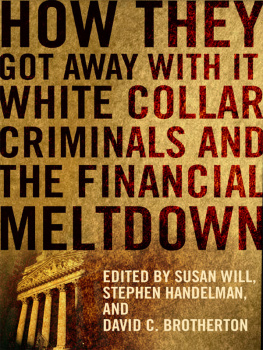Nicholas Carnes is assistant professor of public policy in the Sanford School of Public Policy at Duke University.
The University of Chicago Press, Chicago 60637
The University of Chicago Press, Ltd., London
2013 by The University of Chicago
All rights reserved. Published 2013.
Printed in the United States of America
22 21 20 19 18 17 16 15 14 13 1 2 3 4 5
ISBN-13: 978-0-226-08700-9 (cloth)
ISBN-13: 978-0-226-08714-6 (paper)
ISBN-13: 978-0-226-08728-3 (e-book)
DOI: 10.7208/chicago/9780226087283.001.0001
Library of Congress Cataloging-in-Publication Data
Carnes, Nicholas, 1984
White-collar government : the hidden role of class in economic policy making / Nicholas Carnes.
pages cm (Chicago studies in American politics)
ISBN 978-0-226-08700-9 (cloth : alk. paper) ISBN 978-0-226-08714-6 (pbk. : alk. paper)ISBN 978-0-226-08728-3 (e-book)
1. Representative government and representationUnited States. 2. Class consciousnessPolitical aspectsUnited States. 3. United StatesEconomic policy. 4. White collar workersPolitical activityUnited States. I. Title. II. Series: Chicago studies in American politics.
JK1021.C365 2013
338.973dc23
2013014446

This paper meets the requirements of ANSI/NISO Z39.48-1992 (Permanence of Paper).
ACKNOWLEDGMENTS
Writing this book never really felt like work. On some level, it really wasnt. Ive spent more of my life cutting two-by-fours, bussing tables, answering phones, ringing up groceries, and loading trucks than I have being a professor in a college. Compared to a day of hanging Sheetrock or a Saturday night washing dishes in a catfish restaurant, a day of research and writing is a piece of cake. But even as research goes, this book was an easy yoke to bear. And that was thanks in large part to the many wonderful friends and colleagues who helped me along the way.
I started working on this book while I was at Princeton University from 2006 to 2011. Its hard to overstate how much I owe my mentors, Chris Achen, Doug Arnold, and Larry Bartels. Each of them provided input on every aspect of my early research on this projectfrom the methodology to the writing. And each of them provided me with constant encouragement along the way. Between Larry writing me a supportive note in a signed copy of his book, Chris calling me Professor Carnes at the coffee machine, and Doug letting me ask just one more question five more times at the end of our meetings, I never doubted that the three of them believed in me. I couldnt have asked for better professional role models, and Ill always be grateful.
I also owe a lot to many of the other faculty, students, and staff I worked with while I was at Princeton. Fred Greenstein provided careful and generous feedback on drafts of everything I wrote. Paul Frymer shared valuable insights about research, teaching, and life as a college professor. Jessica Trounstine shared her data on city councils, helped me analyze them, and reviewed several of my early chapter drafts. Steve Rogers helped me access data on state legislators occupations and provided me with encouragement throughout the process. Congressman Edward P. Beard generously spent an entire afternoon showing me around Providence, Rhode Island, and sharing his experiences, expertise, and wisdom with me. Phil Wallach was an excellent office-mate and offered many helpful suggestions on my work, including that I contact Congressman Beard. Jeff Tessin was a tremendous help and a wonderful friend throughout the entire process. Marty Gilens gave me advice and input every step of the way. Noam Lupu provided me with constant friendship, encouragement, and help with my workand only asked for an occasional chai latte in return. Helene Wood was a constant source of warmth and support who made my days in Princeton much brighter. And Michele Epsteins friendship and advice were among the highlights of my time in New Jersey.
While I was at Princeton, I also had the good fortune of meeting many scholars who were willing to patiently listen to early (and sometimes half-baked) versions of my ideas and provide me with quick and helpful feedback. Im especially grateful to David Mayhew, David Canon, Jeff Cohen, Cesar Zucco, Kate Baldwin, Rikhil Bhavnani, Adam Bonica, Fred Solt, Kathy Newman, Josh Bolten, Theda Skocpol, Karl Rove, Meredith Sadin, Ben Lauderdale, Matt Incantalupo, Mike Miller, Melody Crowder-Meyer, Alex Murphy, and Carol Ann MacGregor. Im also grateful for the opportunities I had to present various parts of this project at the Princeton University American Politics Research Seminar, the Princeton Research Symposium, the Princeton Joint Degree Program research seminar, the Princeton Fellowship of Woodrow Wilson Scholars, and the annual meetings of the Midwest Political Science Association and the Southern Political Science Association (Im especially thankful to two of my SPSA discussants, Michael Crespin and Scot Schraufnagel). At the Social Change: A Harvard-Manchester Initiative summer workshop, Bob Putnam gave me extremely helpful input on an early version of my analyses. I also benefitted from helpful feedback from the faculty and students at Allegheny College, Cornell University, Duke Universitys Sanford School of Public Policy, the Massachusetts Institute of Technology, the University of Maryland, and the University of Tennessee.
My work at Princeton wouldnt have been possible without the financial support I received from the National Science Foundation (under Grant SES-0921163, Doctoral Dissertation Research in Political Science: Social Class and Congressional Decisionmaking) and the Dirksen Congressional Center. And my work would have been much slower without the Princeton Center for the Study of Democratic Politics, which generously provided me with office space and a five-year supply of free espresso.
I moved to Durham, NC, in 2011 to take a job as an assistant professor at the Sanford School of Public Policy at Duke University, and Ive been racking up even more professional and personal debts ever since. The Sanford School gave me a teaching release during my first semester that allowed me to make significant progress on this project. During my second semester, my colleagues Jay Hamilton, Judith Kelley, and Kristin Goss organized a workshop for my book and invited Kay Lehman Schlozman, Rick Hall, John Aldrich, Dave Rohde, and David Brady to join them in commenting on the entire manuscript. The feedback I received that day fundamentally improved the book in more ways than I can possibly list here.
Many of my new colleagues and neighbors at Duke also gave me invaluable moral support as I finished writing this book. Im deeply grateful for all of the lunches with Ken Rogerson, walks with Alma Blount, coffees with Laurie Bley, sci-fi movies with Hugh Macartney, chats with Ellen Gray, and conversations about heavy metal with Marc Bellemare.
 This paper meets the requirements of ANSI/NISO Z39.48-1992 (Permanence of Paper).
This paper meets the requirements of ANSI/NISO Z39.48-1992 (Permanence of Paper).
